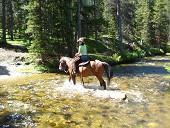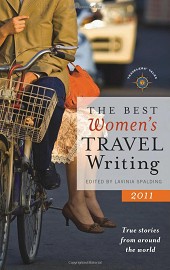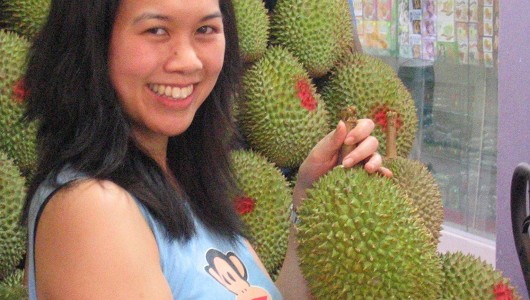Angie Chuang is a writer and educator based in Washington, D.C. Her work has appeared in Lonely Planet’s travel-writing anthology Tales From Nowhere, the Asian American Literary Review, Washingtonian magazine, and other venues. She is on the journalism faculty of American University School of Communication. She was a journalist for thirteen years, as a staff writer for The oregonian, The Hartford Courant, and the Los Angeles Times. She is working on a nonfiction book manuscript centered on her relationship with an Afghan American immigrant family and travels with them in Afghanistan. She has received residencies at Hedgebrook, Jentel, Virginia Center for the Creative Arts, and Caldera.
When did you first know you were a traveler?
My first time on a plane was before I turned two, on a trans-Pacific flight to Taiwan. I have no memory of it. I don’t ever recall not traveling in some way, whether it was those regular trips to Taiwan every few years (I’m trying to figure out when I even became aware that it was another country—as far as I was concerned, it was just visiting Grandma and Grandpa) or the two terms I spent at oxford University (and all over Western Europe) in college.
What’s one place that has moved you or changed you in a significant way?
of course, Afghanistan would be the obvious answer—I wrote my Best Women’s Travel Writing 2011 essay and an entire book manuscript about it. But beyond that, during my journalism career, my first overseas reporting trip was to Vietnam, to write about a survivor of war and a former prostitute who was returning to the places where the most traumatic parts of her life occurred. of course, the experience was intense and emotional, but I also remembered the little things that occurred along the way, between the interviews and the reporting. When I requested a vegetarian meal at a streetside noodle stand, the proprietor hopped on a moped and bought me a to-go dish from another restaurant. Floating on my back, buoyant, in the salty South China Sea. Returning three years later and being greeted like an old friend by people I had met the first time around. These traveler’s experiences alongside the journalistic storytelling—they put each other in sharper relief.
Who is the most inspiring or interesting person you’ve met on the road?
I wouldn’t even know where to begin here! I’ve hardly met a person on my travels who wasn’t interesting or inspiring in some way. I was particularly moved by the young women I befriended in Afghanistan. Everyone from George W. Bush to oprah had invoked Afghan women as a symbol since 9/11; I was thrilled to get to know them as real people, and to talk to them about the things women talk about: our futures, our loved ones, and—of course—men.
What’s one memorable travel experience you’ve had?
In the Big Horn Mountains of Wyoming, I read Farewell to Arms in the cabin in which Hemingway wrote it. The working ranch was generator-run and all of the power went off every night at 10 p.m. That feeling of utter darkness and quiet, and the book in the light of my lantern, was novel (no pun intended!) and cleansing at the same time.
Is there something you always do (or search out, buy, learn, pack, drink), whenever you’re on a trip?
Travel itself is inherently different for women than it is for men, because of cultural, safety, or practical (I doubt men agonize over the cuteness versus comfort of shoes when packing) concerns
And: Pack Immodium. Melatonin. Travel-size packets of Woolite and a portable clothesline. A quarter-roll of toilet paper squashed flat in a Ziploc bag.
Do you think women and men approach travel-or travel writing-differently? How does being a woman affect the way you travel or experience the world?
Travel itself is inherently different for women than it is for men, because of cultural, safety, or practical (I doubt men agonize over the cuteness versus comfort of shoes when packing) concerns. So it follows naturally that travel writing would be different for women and men. For me, writing about travel is a way I reflect on the tension between women’s roles and protocol in other countries’ cultures versus in the United States. How do I find a comfortable place between the two? In Afghanistan, I found it was absolutely possible to wear a headscarf, veil my face at times, be deferential to men, wait for a male escort to take me to certain places, and still “be myself.” Because I have an American feminist self, but I also have a self that wants to be a cultural chameleon, to experience fully the world by becoming as seamless a participant as possible. Doing so came with certain unforeseen privileges, like being privy to the inner sanctum of women where men—who in Afghanistan have all the perceived freedoms of dress and movement outside—were forbidden.
In what ways does writing inform your relationship with travel? Do you keep a journal? Conduct interviews? Write on location?
All of the above—whether because much of my travel intersects with my work as a journalist, or just because my reporter’s habits die hard and I’m afraid I’ll forget or miss something that I might want to use later.
Through travel, have you overcome any fears or obstacles?
Yes, of course. Every arrival in a new place, whether an airplane landing in an unfamiliar airport, any encounter in a new language, or the inevitable getting lost—geographically, emotionally, spiritually—is about the confronting of fear. I suppose since I don’t skydive or do extreme sports, this is my way of experiencing the exhilaration of pushing past those fears into experiences that far outweigh any anxiety or discomfort.
How do you balance your home and travel life? How do you make it work to travel?
Stay single! No, that’s not why I’m single, but it does help.
What advice can you give to women who want to start traveling?
Don’t be afraid to do it alone—you experience a place so much more fully when you do, and a great book and a travel journal can be excellent company (and will never bicker with you). Traveling with companions is also great fun, but choose them carefully. Think fewer places, more time in one place, rather than the “if it’s Tuesday this must be Belgium” approach to travel.
What’s on your list of future destinations?
Now that I’m no longer a working journalist and my travel is no longer connected to reporting, I’m enjoying being open to chance opportunities, going places where I have friends and family, following a whim. My wish list extends from Rome (a repeat visit, but who can get enough of that city?) to Reykjavik, and I’ll go pretty much anywhere as time, budget, and safety allow.
In your opinion, what is the greatest reward of traveling?
People! Meeting, watching, understanding. And what I learn about myself when I awaken out of comfort, routine, and complacency.











